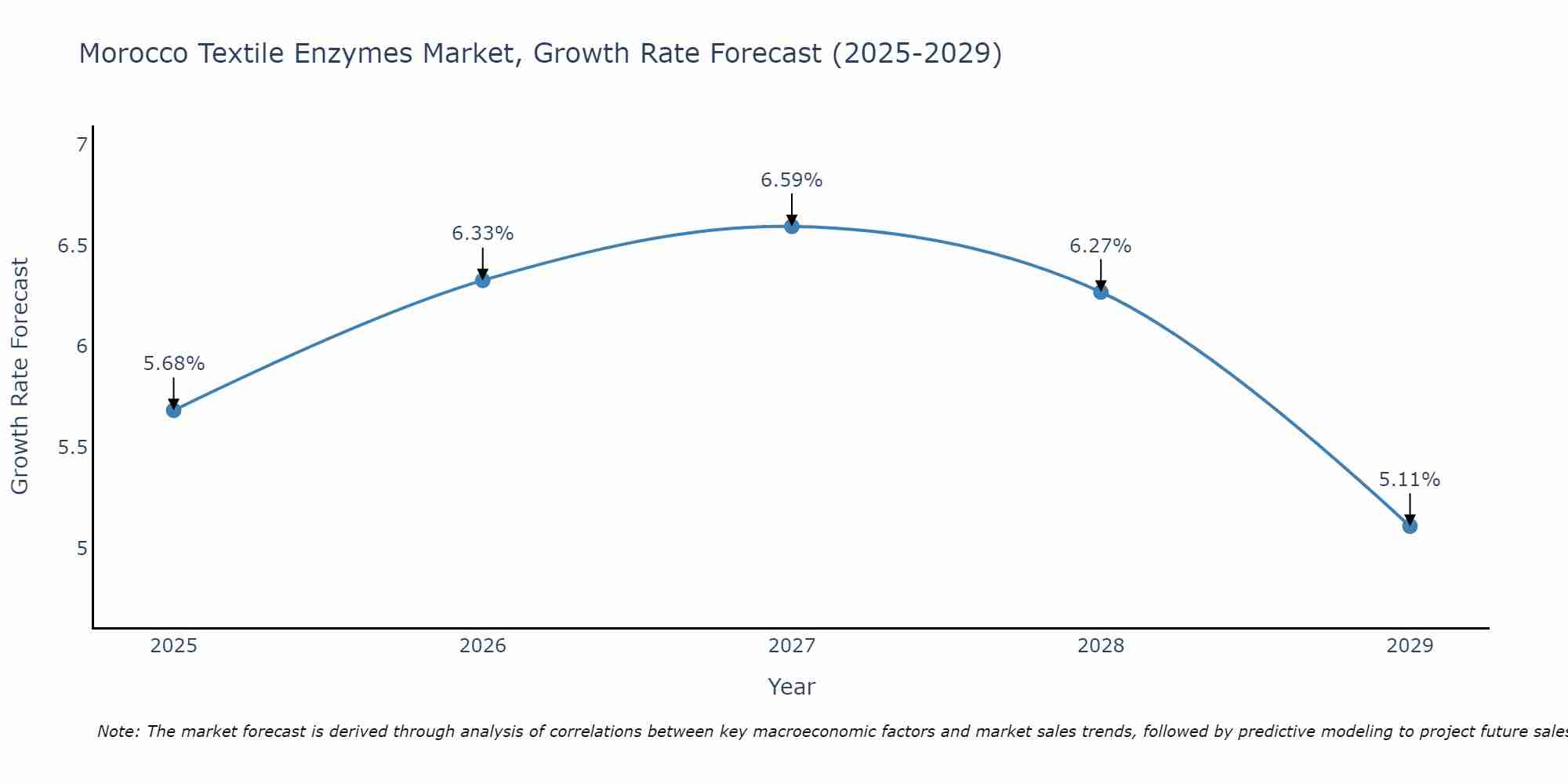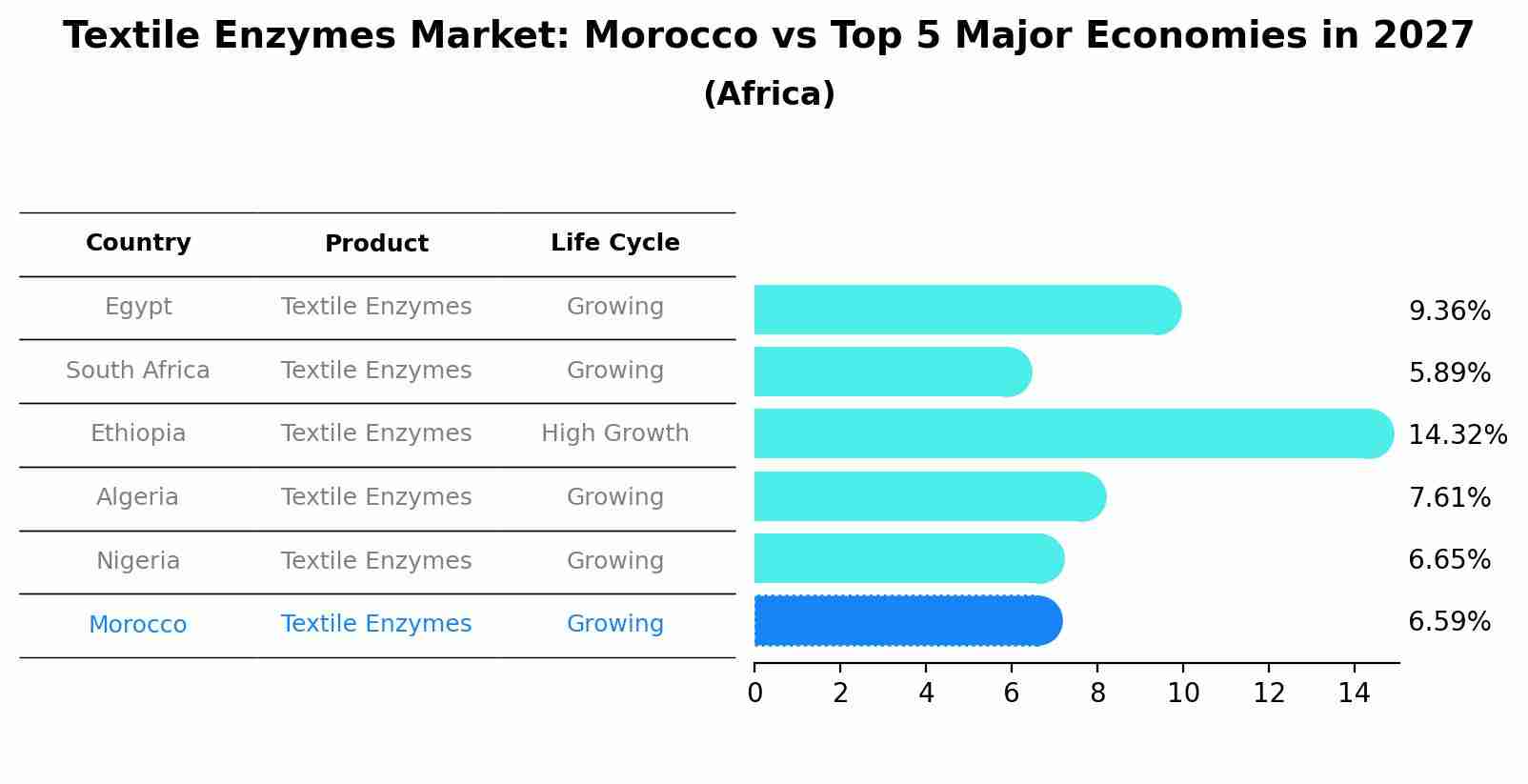Morocco Textile Enzymes Market Outlook | Revenue, Value, Trends, Size, COVID-19 IMPACT, Analysis, Growth, Industry, Forecast, Companies & Share
| Product Code: ETC094092 | Publication Date: Jun 2021 | Updated Date: Jun 2025 | Product Type: Report | |
| Publisher: 6Wresearch | Author: Shubham Deep | No. of Pages: 70 | No. of Figures: 35 | No. of Tables: 5 |
Morocco Textile Enzymes Market Size Growth Rate
The Morocco Textile Enzymes Market is projected to witness mixed growth rate patterns during 2025 to 2029. Starting at 5.68% in 2025, the market peaks at 6.59% in 2027, and settles at 5.11% by 2029.

Textile Enzymes Market: Morocco vs Top 5 Major Economies in 2027 (Africa)
The Textile Enzymes market in Morocco is projected to grow at a growing growth rate of 6.59% by 2027, within the Africa region led by Egypt, along with other countries like South Africa, Ethiopia, Algeria and Nigeria, collectively shaping a dynamic and evolving market environment driven by innovation and increasing adoption of emerging technologies.

Morocco Textile Enzymes Market Overview
The Morocco Textile Enzymes Market is witnessing steady growth driven by factors such as increasing demand for eco-friendly textile processing solutions, rising awareness about sustainable practices in the textile industry, and growing focus on reducing water and energy consumption in textile manufacturing processes. Enzymes play a crucial role in enhancing the efficiency of various textile processing stages such as desizing, scouring, bleaching, and finishing. Key players in the Morocco Textile Enzymes Market are increasingly focusing on developing innovative enzyme solutions to cater to the specific needs of the textile industry in the region. With the government`s initiatives to promote sustainable practices and the shifting consumer preferences towards eco-friendly products, the demand for textile enzymes is expected to further rise in Morocco, presenting significant opportunities for market growth and expansion.
Morocco Textile Enzymes Market Trends
The Morocco Textile Enzymes Market is experiencing a shift towards sustainable and eco-friendly solutions, with a growing demand for enzymes that reduce water usage and chemical waste in textile processing. Enzymes that offer improved efficiency in processes such as desizing, bio-polishing, and denim finishing are particularly gaining traction among textile manufacturers in Morocco. Additionally, there is a rising adoption of enzymes for specialized applications like fabric softening and color brightening to meet the increasing consumer demand for high-quality and environmentally friendly textiles. Companies in the Morocco Textile Enzymes Market are also focusing on research and development to introduce innovative enzyme solutions that enhance product performance while minimizing the environmental impact of textile production processes.
Morocco Textile Enzymes Market Challenges
In the Morocco Textile Enzymes Market, some of the key challenges include limited awareness and understanding of the benefits of using enzymes in textile processing among manufacturers and consumers, which hinders the widespread adoption of enzyme-based products. Additionally, there may be resistance to change traditional methods and reluctance to invest in new technologies due to concerns about costs and potential disruptions to existing production processes. Furthermore, the availability of skilled labor with expertise in enzyme applications and the need for specialized equipment for enzyme treatment pose challenges for smaller players in the market. Overall, overcoming these challenges would require targeted education and training programs, collaboration between industry stakeholders, and strategic investments in research and development to drive innovation and enhance the competitiveness of the Morocco Textile Enzymes Market.
Morocco Textile Enzymes Market Investment Opportunities
The Morocco Textile Enzymes Market presents promising investment opportunities due to the increasing demand for eco-friendly and sustainable textile production processes. Enzymes are being increasingly utilized in the textile industry to reduce water consumption, energy usage, and chemical usage during various stages of production such as desizing, bio-polishing, and denim finishing. With consumers` growing awareness of environmental issues and their preference for sustainable products, the demand for textile enzymes is expected to rise. Investing in companies that specialize in producing and distributing textile enzymes in Morocco could be a lucrative opportunity. Additionally, partnering with textile manufacturers to provide enzyme solutions for their production processes could also prove to be a profitable investment strategy in the evolving Moroccan textile market.
Morocco Textile Enzymes Market Government Policy
The Moroccan government has been implementing various policies to support the growth of the textile enzymes market. These policies include providing financial incentives and tax breaks to encourage investment in the industry, promoting research and development activities to drive innovation, and supporting the adoption of sustainable practices to minimize the environmental impact of textile production. Additionally, the government has been focusing on strengthening partnerships between industry players, research institutions, and educational organizations to enhance the overall competitiveness of the sector. Overall, these policies aim to create a conducive business environment for the textile enzymes market in Morocco, fostering growth, job creation, and sustainability in the industry.
Morocco Textile Enzymes Market Future Outlook
The future outlook for the Morocco Textile Enzymes Market appears promising, with a projected steady growth trajectory driven by increasing demand for eco-friendly and sustainable textile processing solutions. The market is expected to benefit from the rising awareness among consumers and manufacturers regarding the environmental impact of traditional textile processing methods. Additionally, advancements in enzyme technology, leading to enhanced performance and cost-effectiveness, are anticipated to further fuel market growth. Key players in the industry are likely to focus on research and development activities to introduce innovative enzyme products tailored to meet the evolving needs of the textile sector in Morocco. Overall, the market is poised for expansion as the textile industry continues to prioritize sustainability and efficiency in its operations.
Key Highlights of the Report:
- Morocco Textile Enzymes Market Outlook
- Market Size of Morocco Textile Enzymes Market, 2021
- Forecast of Morocco Textile Enzymes Market, 2027
- Historical Data and Forecast of Morocco Textile Enzymes Revenues & Volume for the Period 2018 - 2027
- Morocco Textile Enzymes Market Trend Evolution
- Morocco Textile Enzymes Market Drivers and Challenges
- Morocco Textile Enzymes Price Trends
- Morocco Textile Enzymes Porter's Five Forces
- Morocco Textile Enzymes Industry Life Cycle
- Historical Data and Forecast of Morocco Textile Enzymes Market Revenues & Volume By Type for the Period 2018 - 2027
- Historical Data and Forecast of Morocco Textile Enzymes Market Revenues & Volume By Cellulase for the Period 2018 - 2027
- Historical Data and Forecast of Morocco Textile Enzymes Market Revenues & Volume By Amylase for the Period 2018 - 2027
- Historical Data and Forecast of Morocco Textile Enzymes Market Revenues & Volume By Catalase for the Period 2018 - 2027
- Historical Data and Forecast of Morocco Textile Enzymes Market Revenues & Volume By Pectinase for the Period 2018 - 2027
- Historical Data and Forecast of Morocco Textile Enzymes Market Revenues & Volume By Laccase for the Period 2018 - 2027
- Historical Data and Forecast of Morocco Textile Enzymes Market Revenues & Volume By Others for the Period 2018 - 2027
- Historical Data and Forecast of Morocco Textile Enzymes Market Revenues & Volume By Application for the Period 2018 - 2027
- Historical Data and Forecast of Morocco Textile Enzymes Market Revenues & Volume By Bio-polishing for the Period 2018 - 2027
- Historical Data and Forecast of Morocco Textile Enzymes Market Revenues & Volume By Desizing for the Period 2018 - 2027
- Historical Data and Forecast of Morocco Textile Enzymes Market Revenues & Volume By Enzymatic Bleaching for the Period 2018 - 2027
- Historical Data and Forecast of Morocco Textile Enzymes Market Revenues & Volume By Bioscouring for the Period 2018 - 2027
- Historical Data and Forecast of Morocco Textile Enzymes Market Revenues & Volume By Others for the Period 2018 - 2027
- Morocco Textile Enzymes Import Export Trade Statistics
- Market Opportunity Assessment By Type
- Market Opportunity Assessment By Application
- Morocco Textile Enzymes Top Companies Market Share
- Morocco Textile Enzymes Competitive Benchmarking By Technical and Operational Parameters
- Morocco Textile Enzymes Company Profiles
- Morocco Textile Enzymes Key Strategic Recommendations
Frequently Asked Questions About the Market Study (FAQs):
Export potential assessment - trade Analytics for 2030
Export potential enables firms to identify high-growth global markets with greater confidence by combining advanced trade intelligence with a structured quantitative methodology. The framework analyzes emerging demand trends and country-level import patterns while integrating macroeconomic and trade datasets such as GDP and population forecasts, bilateral import–export flows, tariff structures, elasticity differentials between developed and developing economies, geographic distance, and import demand projections. Using weighted trade values from 2020–2024 as the base period to project country-to-country export potential for 2030, these inputs are operationalized through calculated drivers such as gravity model parameters, tariff impact factors, and projected GDP per-capita growth. Through an analysis of hidden potentials, demand hotspots, and market conditions that are most favorable to success, this method enables firms to focus on target countries, maximize returns, and global expansion with data, backed by accuracy.
By factoring in the projected importer demand gap that is currently unmet and could be potential opportunity, it identifies the potential for the Exporter (Country) among 190 countries, against the general trade analysis, which identifies the biggest importer or exporter.
To discover high-growth global markets and optimize your business strategy:
Click Here- Single User License$ 1,995
- Department License$ 2,400
- Site License$ 3,120
- Global License$ 3,795
Search
Thought Leadership and Analyst Meet
Our Clients
Related Reports
- Saudi Arabia Car Window Tinting Film, Paint Protection Film (PPF), and Ceramic Coating Market (2025-2031) | Strategy, Consumer Insights, Analysis, Investment Trends, Opportunities, Growth, Size, Share, Industry, Revenue, Segments, Value, Segmentation, Supply, Forecast, Restraints, Outlook, Competition, Drivers, Trends, Demand, Pricing Analysis, Competitive, Strategic Insights, Companies, Challenges
- South Africa Stationery Market (2025-2031) | Share, Size, Industry, Value, Growth, Revenue, Analysis, Trends, Segmentation & Outlook
- Afghanistan Rocking Chairs And Adirondack Chairs Market (2026-2032) | Size & Revenue, Competitive Landscape, Share, Segmentation, Industry, Value, Outlook, Analysis, Trends, Growth, Forecast, Companies
- Afghanistan Apparel Market (2026-2032) | Growth, Outlook, Industry, Segmentation, Forecast, Size, Companies, Trends, Value, Share, Analysis & Revenue
- Canada Oil and Gas Market (2026-2032) | Share, Segmentation, Value, Industry, Trends, Forecast, Analysis, Size & Revenue, Growth, Competitive Landscape, Outlook, Companies
- Germany Breakfast Food Market (2026-2032) | Industry, Share, Growth, Size, Companies, Value, Analysis, Revenue, Trends, Forecast & Outlook
- Australia Briquette Market (2025-2031) | Growth, Size, Revenue, Forecast, Analysis, Trends, Value, Share, Industry & Companies
- Vietnam System Integrator Market (2025-2031) | Size, Companies, Analysis, Industry, Value, Forecast, Growth, Trends, Revenue & Share
- ASEAN and Thailand Brain Health Supplements Market (2025-2031) | Strategy, Consumer Insights, Analysis, Investment Trends, Opportunities, Growth, Size, Share, Industry, Revenue, Segments, Value, Segmentation, Supply, Forecast, Restraints, Outlook, Competition, Drivers, Trends, Demand, Pricing Analysis, Competitive, Strategic Insights, Companies, Challenges
- ASEAN Bearings Market (2025-2031) | Strategy, Consumer Insights, Analysis, Investment Trends, Opportunities, Growth, Size, Share, Industry, Revenue, Segments, Value, Segmentation, Supply, Forecast, Restraints, Outlook, Competition, Drivers, Trends, Demand, Pricing Analysis, Competitive, Strategic Insights, Companies, Challenges
Industry Events and Analyst Meet
Whitepaper
- Middle East & Africa Commercial Security Market Click here to view more.
- Middle East & Africa Fire Safety Systems & Equipment Market Click here to view more.
- GCC Drone Market Click here to view more.
- Middle East Lighting Fixture Market Click here to view more.
- GCC Physical & Perimeter Security Market Click here to view more.
6WResearch In News
- Doha a strategic location for EV manufacturing hub: IPA Qatar
- Demand for luxury TVs surging in the GCC, says Samsung
- Empowering Growth: The Thriving Journey of Bangladesh’s Cable Industry
- Demand for luxury TVs surging in the GCC, says Samsung
- Video call with a traditional healer? Once unthinkable, it’s now common in South Africa
- Intelligent Buildings To Smooth GCC’s Path To Net Zero


















